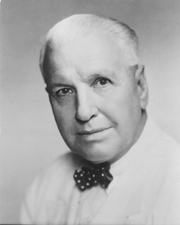Guy M. Gillette
| Guy Gillette | |
|---|---|
 |
|
|
United States Senator from Iowa |
|
|
In office November 4, 1936 – January 3, 1945 |
|
| Preceded by | Richard L. Murphy |
| Succeeded by | Bourke B. Hickenlooper |
|
In office January 3, 1949 – January 3, 1955 |
|
| Preceded by | George A. Wilson |
| Succeeded by | Thomas E. Martin |
| Member of the U.S. House of Representatives from Iowa's 9th district |
|
|
In office March 4, 1933 – November 3, 1936 |
|
| Preceded by | Charles E. Swanson |
| Succeeded by | Vincent F. Harrington |
| Member of the Iowa Senate | |
|
In office 1912–1916 |
|
| Personal details | |
| Born |
Guy Mark Gillette February 3, 1879 Cherokee, Iowa |
| Died | March 3, 1973 (aged 94) Cherokee, Iowa |
| Political party | Democratic |
Guy Mark Gillette (February 3, 1879 – March 3, 1973) was a Democratic U.S. Representative and Senator from Iowa. In the U.S. Senate, Gillette was elected, re-elected, defeated, elected again, and defeated again.
Born in Cherokee, Iowa, he attended public school and graduated from Drake University Law School in Des Moines in 1900. He was admitted to the bar in 1900 and commenced practice in Cherokee. During the Spanish–American War, he served as a sergeant in the Fifty-second Iowa Regiment in the United States Army, but never saw combat. He volunteered to fight against the British in Africa in the Boer War, but was turned down.
Returning to Iowa, he engaged in agricultural pursuits and was the city attorney of Cherokee in 1906–1907. He became the prosecuting attorney of Cherokee County from 1907 to 1909 and a member of the Iowa State Senate from 1912 to 1916.
During the First World War, he served as a captain in the United States Army. He ran unsuccessfully for Iowa State Auditor in 1918, and returned to Cherokee to farm.
In 1932, in the Roosevelt landslide, he was elected as a Democrat to represent Iowa's 9th congressional district, in heavily-Republican northwest Iowa. He was re-elected in 1934, and served nearly all of that term. He resigned upon his election to the United States Senate on November 3, 1936 to serve out the remainder of the term of Senator Richard Louis Murphy, who had died in an auto accident. Nearly two years remained in Murphy's term, which would end January 3, 1939. Although he generally supported the New Deal, he opposed the new wage and hours bill, a new farm bill, and aspects of the Social Security system.
...
Wikipedia
